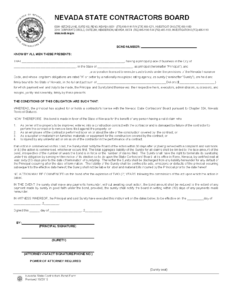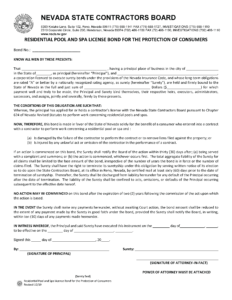Nevada contractors must put up a Nevada Contractor License Bond to operate in the state. This is a surety bond that guarantees that the contractor will comply with state laws and regulations. A contractor who violates those obligations may have a claim made against the license bond. This protects the general public by making funds available in the event of a claim and it gives the contractor reasons to resolve the issue or the surety bond company will seek reimbursement. Contractors licensing and bonding is handled through The Nevada State Contractors Board.
Amount of Bond for Nevada Contractors License Bond
Unlike many states, Nevada does not have a set license bond amount for contractors. The amount of the license bond is set by the state at the time of licensing and is determined based on experience, type of license, character of the applicant and financial responsibility. The bond amounts can range from $1,000 to $500,000.
Nevada Contractor Bond Requirements
Nevada requires that Contractor License Bonds be continuous in nature and the surety bond company will need to provide a notice in writing at least 60 days prior to cancelling the license bond. The state also requires all Nevada Contractor License Bonds to be rate “A” or better and authorized to do business in the state. The state does not specify which rating company to use but we feel A.M. Best is a good option. Contractors also need to be careful as a rating of (A-) technically does not fit this qualification. The required license bond form can be found here.
A Countersignature is Not Required
The NSCB website still states that a resident countersignature is required. Countersignature Requirements require that an agent residing in the state sign the surety bond and usually share in the commission. These laws were originally put in place to ensure that bonds were written with local laws in mind. However, in today’s world, countersignature requirements are not appropriate and have been eradicated in all 50 U.S. states. One of the most recent cases striking down this provision can be found here. Often websites are slow to get updated and governments may be unaware that these countersignatures are no longer required.
Consumer Protection Bond and Swimming Pool Contractors
Another separate requirement in Nevada is that residential swimming pool and spa contractors may have to post a Consumer Protection Bond. This bond would be in addition to the Nevada Contractor License Bond. These Consumer Protection Bonds will be a minimum of $10,000 and a maximum of $400,000. Contractors can find the bond form here. Pool contractors may also be required to post performance bonds and payments bonds in the amount of 50% of the project. Contractors should be aware that most surety bond companies will charge for 100% of the contract amount even if the state requirement is only 50%.
Alternatives to Nevada Contractors License Bonds
If a contractor does not want to obtain a license bond, they can post an Irrevocable Letter of Credit with state. If a contractor chooses this option, the state will charge a $200 a year administration fee. Additionally, they will hold the letter of credit for an additional two years to comply with the Statute of Limitations. There are other reasons why contractors may want to reconsider a letter of credit. Irrevocable Letters of Credit are just that. If a consumer makes a claim against the contractor, that money is gone with little or no defense. On the other hand, a surety bond company must investigate a surety bond claim and make sure it is valid. This protects contractors for frivolous claims. You can read more about bonds vs. letters of credit here.
Underwriting Nevada Contractor License Bonds
Most of these license bonds are underwritten based on the personal credit of the owner or owners. Usually these license bonds are easily obtainable, and we can get them approved in a matter of minutes. A contractor should be ready to provide the following information:
• Name of Business
• Address of Business
• EIN:
• Type of Organization
• Years In Business
• Name of Owner(s)
• Owner(s) Home Address
• Owner(s) Social Security Number(s) – To run credit
• Ownership Percentages
• License or Application Number
• Amount of Surety Bond Requested
For contractors with lower credit scores or higher license bond requirements, additional information may be required such as personal financial statements and/or financial statements on the company.
Indemnity Required
Nevada Contractors License Bonds are written on the Principle of Indemnity. That means the Contractor will need to sign an indemnity agreement and will have to reimburse the surety bond company if a valid claim is filed against the license bond.
Cost of Nevada Contractor License Bonds
The cost of these license bonds can be less than 1% and as much as 10% depending on the contractor’s circumstances. Most contractor license bonds will be about 1%. Contractors can get significant discounts for purchasing multiple years up front. MG Surety Bonds works with 25+ surety bond companies and will work to get each contractor the best rate depending on their circumstances.
Who Needs a License and Nevada Contractor License Bond?
Per NRS 624.020, a contractor is a person who undertakes or offers to construct, alter, repair, add to, subtract from, improve, move, wreck or demolish any building or other structure. This includes a subcontractor or specialty contractor but not a material supplier. A contractor also includes a construction manager who performs management and counseling services on a construction project for a professional fee. All contractors must be licensed prior to contracting (bidding, offering to engage, or negotiating a price).
This section means that nearly all contractors need to be licensed and and have a valid Contractor License Bond to operate in Nevada. There are exceptions such as performing work on your own property but most contractors performing work in the state for compensation need to be licensed and bonded.
Other Construction Bonds May Be Required
Getting a contractor license bond is a minimum requirement for most contractor to operate in the state of Nevada. However, contractors may need other construction surety bonds such as Bid Bonds, Performance Bonds and Payment Bonds. These surety bonds provide different guarantees and have different costs and underwriting requirements. However, we can help Nevada contractors with all types of surety bonds.
Verify the Bond
Unfortunately, there is fraud in the surety bond industry. We always advise contractors and consumers to verify surety bonds so that you know you are getting the protection you are expecting. You can read more about how to verify surety bonds here.
Operating without a license or contractor license bond can land a contractor in trouble with the state. These license bonds are typically easy to obtain and inexpensive. We are surety bond experts and can work with contractors of all circumstances to obtain surety bonds. Contact us anytime.



